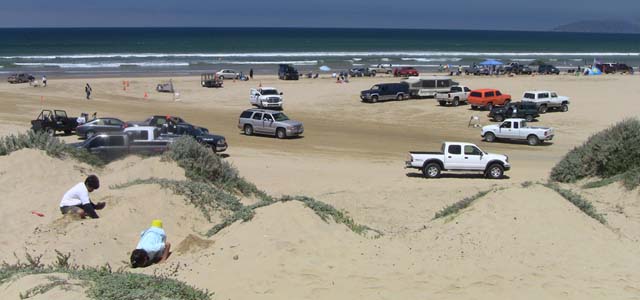Friends of Oceano Dunes sues the Coastal Commission
April 14, 2016

By JOSH FRIEDMAN
An off-roading organization that is attempting to overturn the Oceano Dunes dust rule has sued the California Coastal Commission over the agency’s role in implementing the controversial regulation. The lawsuit also names California state parks as a co-defendant and the San Luis Obispo County Air Pollution Control District (APCD) as a party of interest.
The dust rule requires state parks to reduce the particulate matter blowing from the Oceano Dunes State Vehicular Recreation Area or face fines of $1,000 per day. The rule is based on a contested study that concluded off-road vehicle activity on the dunes has caused an increase in particulate matter blowing to the Nipomo Mesa.
Last week, Friends of Oceano Dunes filed suit in San Luis Obispo Superior Court, alleging the Coastal commission illegally issued emergency coastal development permits to state parks for dust control projects. Friends previously sued the APCD over the dust rule, and a multi-year court battle over the regulation remains unsettled.
In order to comply with with the dust rule, state parks workers placed plastic fencing in the dunes. The fence spans about 40 acres, according to Friends’ lawsuit. It is intended to mitigate dust levels.
State parks has also placed monitoring equipment, solar panels, toxic batteries and station amenities in the dunes, according to the lawsuit.
The suit states the Coastal Commission waived its standard environmental review requirements and issued emergency permits to state parks so the agency could enact the dust control measures. The Coastal Commission has issued a series of annual emergency permits since 2013.
Friends argues no emergency exists, and state parks must complete the regular coastal development process, which includes an environmental impact report. The plaintiff also argues dust control activities could impact the sensitive coastal dune habitat.
The off-roading organization is demanding the court put a halt to dust monitoring measures until state parks complete the environmental review process and the Coastal Commission issues a regular permit. Friend is also asking the court to remove all dust monitoring equipment and open off-roading areas that have been closed for dust control purposes.
Friends is likewise requesting reimbursement for its legal costs.
A separate lawsuit Friends filed has led to a court invalidating part of the dust rule. In 2012, Friends sued the APCD, arguing the agency used flawed scientific practices and failed to prove off-road activity caused an increase in pollution on the Nipomo Mesa.
Last year, the 2nd District Court of Appeal ruled that an air pollution control district does not have the power to regulate emissions from a state park by a permit requirement. The ruling nullified a section of the dust rule that required state parks to obtain a permit from the air district in order to operate the riding area.
In March, San Luis Obispo Judge Charles Crandall ruled the removal of the permit requirement does not void the entire dust rule and the APCD retains the power to enforce the regulation through civil penalties and other coercive action. Friends may appeal Crandall’s ruling.
The APCD and San Luis Obispo County have faced several lawsuits pertaining to the dust rule and regulation of the off-road riding area. It has already cost the APCD alone more than $1 million to fight the lawsuits.






The comments below represent the opinion of the writer and do not represent the views or policies of CalCoastNews.com. Please address the Policies, events and arguments, not the person. Constructive debate is good; mockery, taunting, and name calling is not. Comment Guidelines